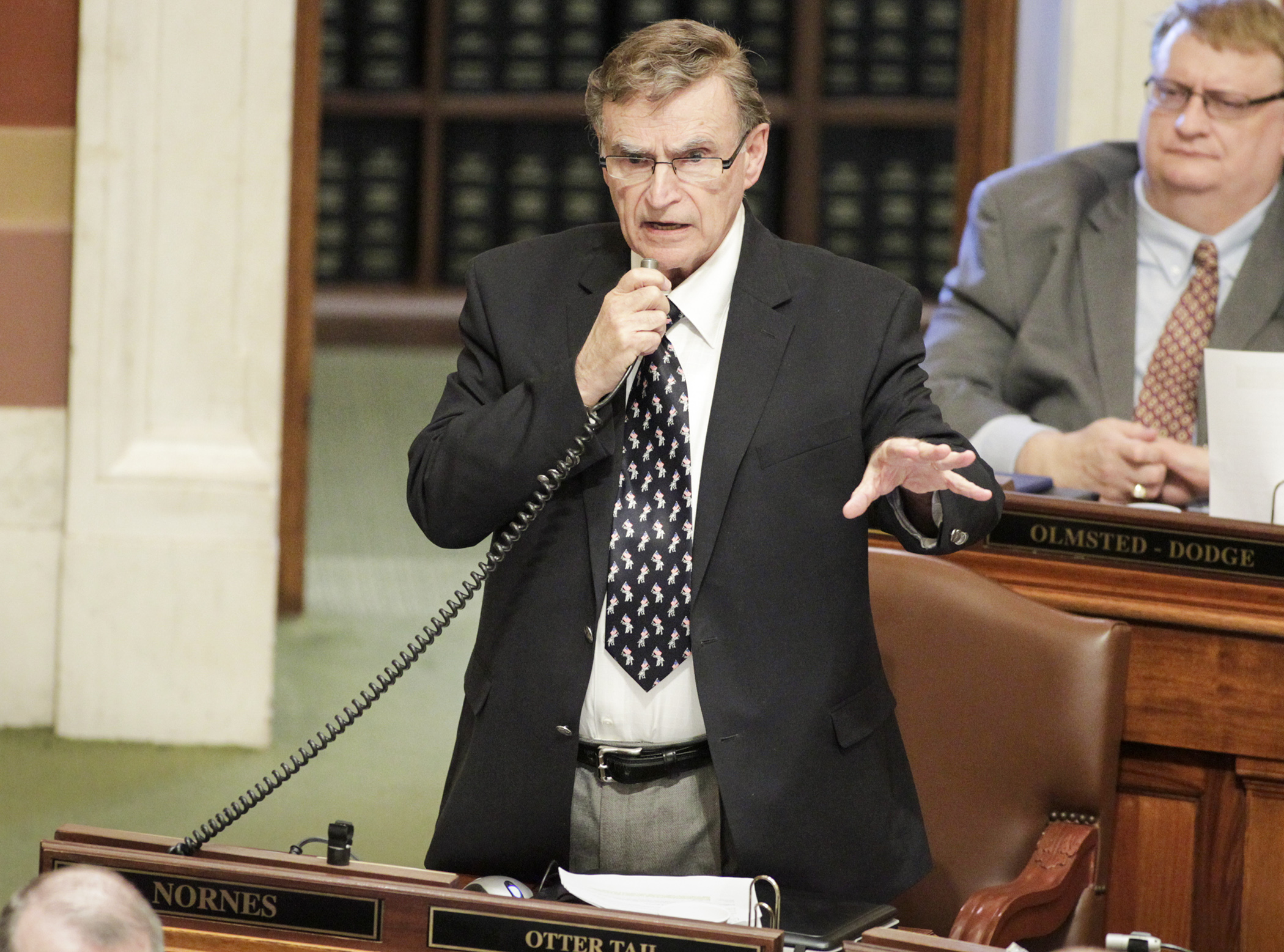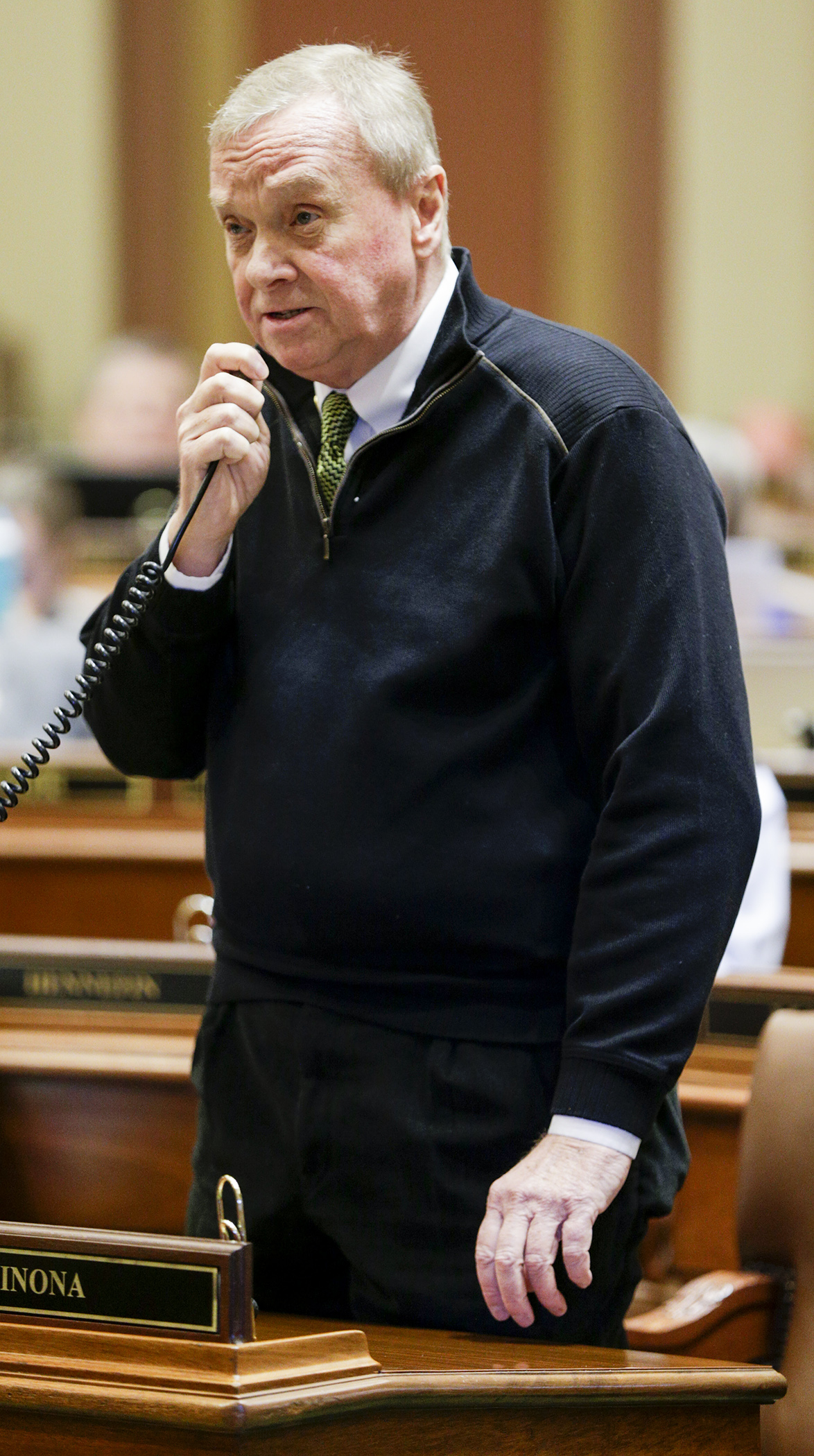House passes ‘affordable, accountable’ higher education omnibus bill

Legislators this session are focused on providing affordability, accountability and accessibility for post-secondary education while carving out a proposal Gov. Mark Dayton will ultimately sign.
“I think we have a good bill with various initiatives that help students,” said Rep. Bud Nornes (R-Fergus Falls). “We’re doing the best we can with what we have to deal with.”
He and Senate President Michelle Fischbach (R-Paynesville) sponsor HF2477/SF2214*, the omnibus higher education finance bill, that was passed 77-53 by the House Tuesday. The bill was previously amended by the House Ways and Means Committee to include the House language and another amendment was added on the House Floor.
The bill now returns to the Senate, where that version was passed 36-31 one week ago. A conference committee is expected to work out the differences.
“I couldn’t be more proud of this bill and what it contains,” said Rep. Nick Zerwas (R-Elk River).
However, not all lawmakers were as optimistic.
“This is a bill that tries to address many things,” said Rep. Gene Pelowski Jr. (DFL-Winona). “Unfortunately it does none of them well.”
“Does it have everything? No. But we need to recognize it’s about choices,” Rep. Barb Haley (R-Red Wing) said. “I encourage people to look at the positives.”
Future funding
In total, higher education spending would reach $3.22 billion from the General Fund in the 2018-19 biennium, an increase of $149.5 million from the current two-year total.
New appropriations over the biennium include $4 million for spinal cord injury research grants; $2.5 million for workforce development scholarships; $2 million for Minnesota Life college grants; $1 million for the students with intellectual and developmental disabilities program and $400,000 for both student debt counseling and teacher candidates of color scholarships.
 Rep. Gene Pelowski Jr. describes what he feels are some shortcomings of the omnibus higher education finance and policy bill during House Floor debate April 4. Photo by Paul Battaglia
Rep. Gene Pelowski Jr. describes what he feels are some shortcomings of the omnibus higher education finance and policy bill during House Floor debate April 4. Photo by Paul BattagliaThe University of Minnesota would receive $1.2 billion over the biennium, an increase of $10 million and $12 million in the respective fiscal years. The university’s original budget request was an increase of $147.2 million over the biennium.
Minnesota State would receive $1.4 billion over the period, an increase of $42 million in Fiscal Year 2018 and $51 million in Fiscal Year 2019.
Laura King, chief financial officer for Minnesota State, previously noted the bill contains roughly half of the $178 million in new biennial funding requested. “If this bill becomes law, our campuses will have significant financial pressure,” she said.
A policy provision in the bill would require two-year colleges in the Minnesota State system to freeze tuition at the 2017-18 academic year rate in the second year of the biennium.
The Office of Higher Education would receive $501 million during the biennium, a $33.8 million increase. The largest portion would go to state grants, allocating $193 million per year — up from the current $180 million.
Targeting tuition
The bill did not include the $35 million in Fiscal Year 2018 and $44 million in Fiscal Year 2019, which was part of the bill when it was approved March 23 by the House Higher Education and Career Readiness Policy and Finance Committee. That funding was targeted to reduce tuition rates by at least 1 percent at all Minnesota State colleges.
An amendment successfully offered by Rep. Glenn Gruenhagen (R-Glencoe) would encourage the university to adopt tuition rate schedule close to the median of other Big Ten universities. Due to the university’s constitutional autonomy, the state cannot require it to adhere to the potential change.
“This is exactly the kind of amendment we should not be doing on the House Floor,” Pelowski said. “We should be hearing this in committee.”
Politicking policies
The funding proposed in both the House and Senate bills would result in slight appropriation adjustments. But it’s what the appropriations fund and other policy provisions that have fueled debate along the bill’s path through the Legislature.
It’s more policy in a finance bill they have been asked to “keep clean,” some contend.
Another contentious provision would allow automatic acceptance to Minnesota State colleges for students who are rank in the top-10 grade-point average of their high school class.
WATCH Sponsor introduces the omnibus higher education finance bill on the House Floor
An amendment unsuccessfully offered by Rep. Debra Hilstrom (DFL-Brooklyn Center) would have required an institution that has been charged with fraud or false advertising to be revoked of its degree program. The current proposal allows the Office of Higher Education discretion on a per-case basis.
Recent cases involving for-profit colleges Minnesota School of Business and Globe University were the inspiration behind its offering, but the amendment failed 75-53.
“We can’t make a boogeyman out of the Globe University case,” Rep. Drew Christensen (R-Savage) said. “We need to trust the Office of Higher Education to look at these on a case-by-case basis.”
Related Articles
Search Session Daily
Advanced Search OptionsPriority Dailies
Ways and Means Committee OKs proposed $512 million supplemental budget on party-line vote
By Mike Cook Meeting more needs or fiscal irresponsibility is one way to sum up the differences among the two parties on a supplemental spending package a year after a $72 billion state budg...
Meeting more needs or fiscal irresponsibility is one way to sum up the differences among the two parties on a supplemental spending package a year after a $72 billion state budg...
Minnesota’s projected budget surplus balloons to $3.7 billion, but fiscal pressure still looms
By Rob Hubbard Just as Minnesota has experienced a warmer winter than usual, so has the state’s budget outlook warmed over the past few months.
On Thursday, Minnesota Management and Budget...
Just as Minnesota has experienced a warmer winter than usual, so has the state’s budget outlook warmed over the past few months.
On Thursday, Minnesota Management and Budget...